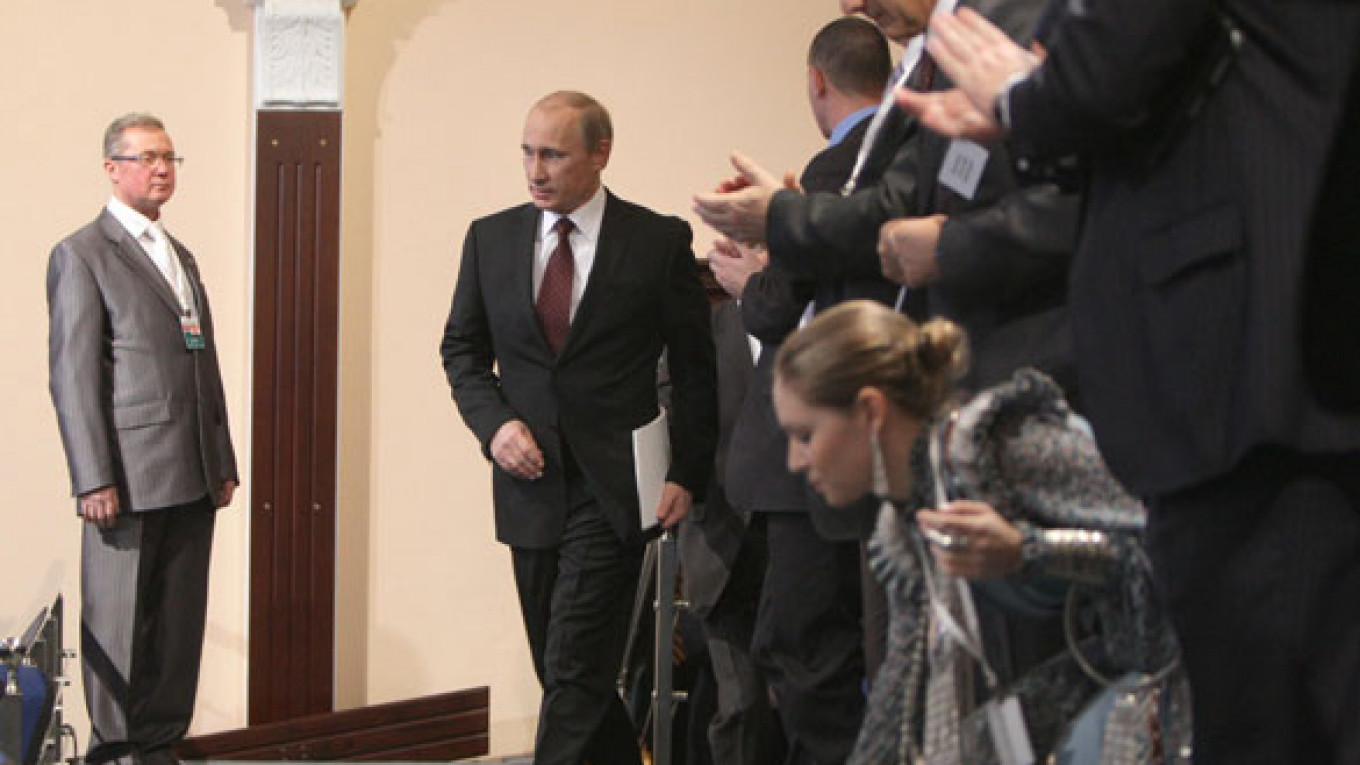United Russia has to deal with tough political competition in the country, Prime Minister Vladimir Putin said Monday, contradicting President Medvedev's recent criticism that the ruling party risks becoming an appendix of the executive branch because of a lack of competition.
But Putin's remarks, made at a United Russia conference in Khabarovsk, failed to impress opposition politicians or analysts, who said the ruling tandem was actually acting in accord as it prepares the ground for State Duma elections next year and the presidential vote in 2012.
“We operate in a competitive political environment and, of course, face criticism from our opponents,” Putin told the conference focused on the development of the Far East in Khabarovsk.
Putin, who heads United Russia without being a card-carrying member, said “well-grounded criticism” was useful and “helps avoid many mistakes,” but did not elaborate.
He also called on United Russia to “think about people” and establish a broader dialogue with voters, working for their welfare and “not for elections.”
“To win in a competitive environment, we need to prove with real actions … our ability to solve real problems of the citizens,” Putin said, according to a transcript of his speech published on his web site.
He said achieving this was within the party's power.
His remarks about political competition were out of tune with a speech that Medvedev gave last month on his video blog, where he said United Russia was close to becoming part of the executive branch and the country faces stagnation because of a lack of political competition. "If the ruling party has no chances to lose anywhere at anytime, it becomes 'bronzed' and ultimately degrades, too,” Medvedev said, winning immediate praise from senior United Russia officials for his remarks.
But the two cogs of the tandem simply speak to different audiences, with Medvedev promising to Western observers to step up democratization and Putin assuring ruling classes inside the country that the current system will undergo no drastic changes in the elections, said Nikolai Petrov, an analyst with the Carnegie Moscow Center. “Medvedev makes more abstract statements aimed at the West, while Putin directly addresses the elites inside the country,” he said by telephone.
Sergei Mitrokhin, leader of the Yabloko liberal party, which failed to win seats in the State Duma in the 2007 elections, dismissed Putin's remarks, saying, “United Russia has always enjoyed favored conditions."
United Russia's critics have linked the party's success to electioneering and support from executive branch for years, but to little avail. The Central Elections Commission and courts routinely reject complaints.
After October 2009 regional elections that were widely criticized as the dirtiest in years, United Russia decided to stage four regional development conferences, including the one in Khabarovsk, this year in what analysts called an effort to negate the effect from a public growing dissatisfied with its performance and lack of political alternatives. The conference resemble to be part of a campaign for the 2011 Duma elections, Mitrokhin and Petrov said.
“United Russia never quits campaigning,” Mitrokhin said.
Meanwhile, Medvedev kept speculation alive about whether he will run for re-election in 2012, saying in interview with the Polish media released by the Kremlin on Monday that “doesn't exclude such a possibility.”
Putin, who was last asked about his 2012 plans on CNN's "Larry King Live" last week, dodged the question.
A Message from The Moscow Times:
Dear readers,
We are facing unprecedented challenges. Russia's Prosecutor General's Office has designated The Moscow Times as an "undesirable" organization, criminalizing our work and putting our staff at risk of prosecution. This follows our earlier unjust labeling as a "foreign agent."
These actions are direct attempts to silence independent journalism in Russia. The authorities claim our work "discredits the decisions of the Russian leadership." We see things differently: we strive to provide accurate, unbiased reporting on Russia.
We, the journalists of The Moscow Times, refuse to be silenced. But to continue our work, we need your help.
Your support, no matter how small, makes a world of difference. If you can, please support us monthly starting from just $2. It's quick to set up, and every contribution makes a significant impact.
By supporting The Moscow Times, you're defending open, independent journalism in the face of repression. Thank you for standing with us.
Remind me later.






